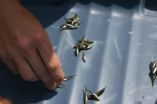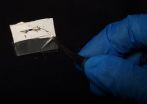(Press-News.org) The European League Against Rheumatism (EULAR) has announced today at its Annual Congress major successes in driving the public agenda for addressing the escalating burden of RMDs in Europe. These advances include:
Recognition for Rheumatic and Musculoskeletal Diseases (RMDs) from major European Commission research initiative, Horizon 2020
'FOREUM', Foundation for Research in Rheumatology, grants research funding for four osteoarthritis projects in its first year.
"It is with great satisfaction that we have seen a progressive dedication of EU research funds for RMDs in recent times. This follows several years of intensive awareness raising activities by EULAR in Brussels," commented Professor Maurizio Cutolo, President of EULAR as well as Chairman of the International League of Associations for Rheumatology (ILAR). "As a result of these activities (including exchanges with EU policy makers and stakeholders), there is now a much better understanding of the real impact of RMDs. There is also consensus about the need to further implement EU actions against these diseases, including in the research field, where EU funds for RMDs related projects have increased in recent years."
EULAR achieves recognition for Rheumatic and Musculoskeletal Diseases from major European Commission research initiative, Horizon 2020
EULAR announces momentous success after achieving recognition for RMDs as one of the five major chronic diseases to be addressed by Horizon 2020, Europe's largest ever EU Research and Innovation programme.
Following more than a decade of public affairs activity, EULAR's priority over the past 24 months has been to be recognised as a major condition in the new research framework programme, Horizon 2020, which was initiated on 1 January 2014.
Neil Betteridge, Liaison Officer, Public Affairs, EULAR commented, "I am delighted to report that after much hard work on the part of many people, including many EULAR members at a national level, the legislative text of the new research framework programme now lists RMDs as a major disease alongside a select number of others including cancer, cardiac disease, mental illness and diabetes. To this end, 2013-'14 has seen major successes for EULAR in its effort to influence the European Parliament, the Commission and the Council."
He continued, "The challenge now for EULAR is to ensure that as many calls for funding as possible relate to RMDs. We know that the vast majority of calls will not mention specific diseases by name so we must position RMDs as critical in cross-cutting areas such as prevention, innovation and healthy ageing in order to maximise the flow of research funds to our area."
'FOREUM', Foundation for Research in Rheumatology, grants research funding for four osteoarthritis projects in its first year
The European Rheumatology Research Foundation (ERRF), established by EULAR in 2013, has been renamed FOREUM (pronounced [fo:rəm]), Foundation for Research in Rheumatology. Since its launch, FOREUM has awarded grant funding to four research projects in the field of osteoarthritis.
"EULAR has been the driving force in creating this important research foundation. FOREUM will not only support rheumatology research in Europe, it will also constitute a forum for deliberations on the future rheumatology research arena," commented Professor Josef Smolen, FOREUM President.
"We received 46 funding applications following our 2013 call for research proposals and were proud to select four projects following a peer review process. Osteoarthritis affects a substantial proportion of the European population and FOREUM would like to congratulate the successful teams focussing on this important area of research," he continued.
INFORMATION:
Funding for the four projects will come from a starting donation from EULAR. FOREUM seeks to initiate research of the highest quality oriented towards a broad range of RMDs and will be announcing the call for 2015 projects in the Autumn of this year. Further information can be found at http://www.foreum.org.
NOTES TO EDITORS: For further information, or to request an interview with spokespeople, please contact: EULAR congress Press Office: Room 104, Palais des congrès de Paris Email: eularpressoffice@cohnwolfe.com Onsite tel: +44 (0) 7880 173209 Twitter: @EULAR_Press
About EULAR
The European League Against Rheumatism (EULAR) is an umbrella organisation which represents scientific societies, health professional associations and organisations for people with rheumatic diseases throughout Europe.
EULAR aims to promote, stimulate and support the research, prevention, and treatment of rheumatic diseases and the rehabilitation of those it affects.
With 45 scientific member societies, 35 People with Arthritis and Rheumatism in Europe (PARE) organisations, 17 health professionals associations and 26 corporate members, EULAR highlights the importance of combating rheumatic diseases through both medical means and patient care.
EULAR 2014 is set to be the biggest rheumatology event in Europe with almost 14,000 scientists, physicians, allied health professionals and related audiences in attendance from 130 countries. Over the course of the congress there will be 302 oral and 1,806 poster abstract presentations, 155 sessions, 725 lectures, 33 poster tours with 421 invited speakers.
To find out more about the activities of EULAR, visit: http://www.eular.org
About Horizon 2020
Horizon 2020 is the largest EU Research and Innovation programme ever with nearly €80 billion of funding available over seven years (2014 to 2020). It is the financial instrument implementing the Innovation Union, a Europe 2020 flagship initiative aimed at securing Europe's global competitiveness. In addition to the private investment that this money will attract, it promises more breakthroughs, discoveries and world-firsts by taking great ideas from the lab to the market.
http://ec.europa.eu/programmes/horizon2020/en
About FOREUM
FOREUM Foundation for Research in Rheumatology is devoted to promote research in rheumatic and musculoskeletal diseases (RMDs). It seeks to raise funds from interested commercial and non-commercial donors that share FOREUM's vision and goals: recognising that research and innovation in our field are crucial for improving both the prevention and the management of rheumatic and musculoskeletal disorders (RMDs) and, hence, the living, working and socio-economic conditions of the more than 120 million people in Europe variously afflicted by RMDs.
Whereas FOREUM will define its strategic goals and operations independently, the intention is that it will coordinate its research activities with EULAR in order to avoid unnecessary overlap or otherwise inefficient deployment of precious research resources.
FOREUM is recognised by the Swiss authorities according to Swiss law and foundation regulations as a not-for-profit organisation. Interested potential donors may contact the FOREUM secretariat for more information at info@foreum.org or call +41 43 31 55 66.
EULAR driving research and innovation in rheumatic and RMDs in Europe
2014-06-11
ELSE PRESS RELEASES FROM THIS DATE:
Tendon stimulation the key to repair in 'tennis elbow'
2014-06-11
New data presented today at the European League Against Rheumatism Annual Congress (EULAR 2014) show that ultrasound-guided injections of growth factors-containing platelet-rich plasma (PRP) are no more effective in treating recently developed epicondylitis than injections of saline.1
Lead researcher, Patrick Le Goux of the Hôpitaux Universitaires Paris Ile-de-France Ouest, France, commented, "while PRP injections were shown to have no inherent benefit in the treatment of epicondylitis, what is exciting is that pain scores in both treatment groups decreased significantly ...
Higher disease activity scores in obese RA patients
2014-06-11
A new study presented today at the European League Against Rheumatism Annual Congress (EULAR 2014) showed that obese patients with rheumatoid arthritis (RA) have higher DAS (disease activity) scores than non-obese patients, irrespective of their disease stage.1 With clinical remission as the ultimate therapeutic goal in RA,2 several studies have demonstrated that treatment to target – a treatment approach guided by its impact on reducing DAS scores – is more effective in lowering disease activity and, ultimately, reaching remission than usual care.3-7 Because obese patients ...
Newly discovered paddle prints show how ancient sea reptiles swam
2014-06-11
Trackways formed on an ancient seabed have shed new light on how nothosaurs, ancient marine reptiles that lived during the age of the dinosaurs, propelled themselves through water. The evidence is described by a team from Bristol and China in Nature Communications today.
During the Mesozoic, 252-66 million years ago, the seas were ruled by a variety of marine reptiles. One of the earliest groups were the nothosaurs, voracious semi-aquatic hunters with elongate bodies and paddle-like limbs. They were the top predators of the Triassic coasts, some 245 million years ago.
Their ...
Forest loss starves fish
2014-06-11
Debris from forests that washes into freshwater lakes supplements the diets of microscopic zooplankton and the fish that feed off them – creating larger and stronger fish, new research shows.
The researchers warn that, as forests are eroded through human activities such as logging, the impacts will be felt in aquatic as well as terrestrial food chains.
In fact, the study was conducted at a Canadian lake chosen because it had suffered ecological disaster during the mid-20th century: acid rain as a result of the local nickel smelting industry.
Despite moves to reduce ...
Sports teams may lose out from having 'too much talent'
2014-06-11
As the FIFA World Cup kicks off and the NBA finals "heat" up, new research suggests that there is such a thing as having too much talent on a sports team. The research indicates that, after a certain point, the addition of more superstar talent to a team can actually be detrimental, resulting in poorer team performance.
The findings are forthcoming in Psychological Science, a journal of the Association for Psychological Science.
The research, led by INSEAD Professor Roderick Swaab, showed that the presence of too many individuals with top talent can undermine players' ...
Nearby satellite galaxies don't fit standard model
2014-06-11
Satellite dwarf galaxies at the edges of the Milky Way and neighboring Andromeda defy the accepted model of galaxy formation, and recent attempts to pigeon-hole them into the model are flawed, an international team of scientists reports.
The mismatch raises questions about the accuracy of the standard model of cosmology, which is the widely accepted paradigm for the origin and evolution of the universe, the astrophysicists say.
A preprint of the research paper, accepted for publication by the Monthly Notices of the Royal Astronomical Society, is online at http://arxiv.org/abs/1406.1799.
The ...
Map of universe questioned; dwarf galaxies don't fit standard model
2014-06-11
Dwarf galaxies that orbit the Milky Way and the Andromeda galaxies defy the accepted model of galaxy formation, and recent attempts to wedge them into the model are flawed, reports an international team of astrophysicists.
David Merritt, professor of astrophysics at Rochester Institute of Technology, co-authored "Co-orbiting satellite galaxy structures are still in conflict with the distribution of primordial dwarf galaxies," to be published in an upcoming issue of Monthly Notices of the Royal Astronomical Society. A pre-print of the paper is available online at http://arxiv.org/abs/1406.1799.
The ...
Improvements in MRIs, other image-detection applications on the horizon
2014-06-11
LIVERMORE, Calif. — Researchers at Sandia National Laboratories, along with collaborators from Rice University and the Tokyo Institute of Technology, are developing new terahertz detectors based on carbon nanotubes that could lead to significant improvements in medical imaging, airport passenger screening, food inspection and other applications.
A paper in Nano Letters journal, "Carbon Nanotube Terahertz Detector," debuted in the May 29 edition of the publication's "Just Accepted Manuscripts" section. The paper describes a technique that uses carbon nanotubes to detect ...
Experts unlock key to blood vessel repair
2014-06-11
Scientists from the University of Leeds have found a way to restore the function of damaged blood vessel repairing cells, in a potentially important step for the future treatment of heart disease.
The research, part-funded by the British Heart Foundation (BHF), could also pave the way for new targets for drug development in the fight against heart disease.
The findings have also identified a potential reason why South Asian men in the UK experience an increased risk of heart disease.
Led by Dr Richard Cubbon in the School of Medicine, the research team studied cells ...
New research could provide key to overcoming resistance to HER2 targeted cancer treatments
2014-06-11
Dublin, Ireland, June 11th, 2014 – Scientists from the School of Pharmacy & Pharmaceutical Sciences, Trinity College Dublin have made a significant discovery of a new biomarker which may help overcome resistance to newer and more targeted anti-cancer drugs, such as Herceptin, for HER2 positive cancers. These findings may also help the early identification of patients who will benefit more from these treatments.
The researchers, led by Professor Lorraine O'Driscoll, Associate Professor of Pharmacology, Trinity, studied breast cancer cells and their extracellular vesicles ...



